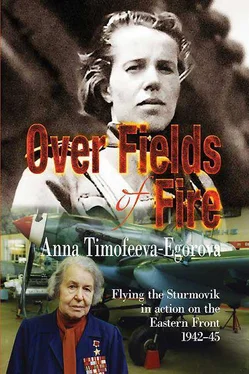“No, Georgiy, thanks for your advice but I’m not going to give up flying.”
And here we are — having done a shift at the shaft we are heading off to our date with the skies as to a festival! It is noisy and cheery in our wagon our way to Malye Vyazemy. We sing songs — a beautiful blonde girl in a dark-blue velveteen dress with red buttons starts singing. She’s got a blue silk kerchief the colour of her eyes on her neck. This is Anya Poleva — also a trainee flyer at the aeroclub. An hour and a half has flown by unnoticed and now we are walking towards the aerodrome. The lawns have become greener over the week we haven’t been here and in some places the bird cherry trees have already blossomed as well. Victor Kroutov runs off the footpath, barges into the bushes and I am presented with the first bouquet of flowers in my life. I am still angry at him but accept the gift. The flowers from Victor are in my hands. I tear off a tiny petal and begin to tell my fortune, whispering to myself “I’ll fly, I won’t fly…” instead of “He loves me, he loves me not…” It comes out that I will fly and, rejoicing, I run lightly and freely towards my future…
What greater thrill can there be in life than flight? I remember it thus: an airfield with skylarks and bluebells. Our planes are lined up, as are we in our brand new dark blue overalls and OSOAVIAHIM 29 29 Editor’s note — The Society of Assistance to Defence, Aviation and Chemical Construction. It was established in 1927 by the merging of the Voluntary Society of Friends of the Air Fleet, Chemical Defense and Industry of the USSR and the Society of the Assistance to Defence. In 1948 it was divided into three Societies — the Voluntary Society of Assistance to the Army, the Voluntary Society of Assistance to the Air Force, and the Voluntary Society of Assistance to the Navy.
helmets with goggles. Each group stood by its plane. Everyone stood to attention. A light breeze was blowing in our faces, we were breathing easily and freely. And it was so nice to live in this world, so joyful! I thought that there would be no end to our youth or to our lives…
“To your planes!” the head of the aeroclub orders.
Our instructor Georgiy Miroevskiy takes his seat in the front cockpit, a trainee pilot, Tougoushy, in the rear. We all envy our comrade: he is lucky to be the first to go up in the sky.
“Sta-art engines!” the head of flying gives the command.
“It’s turned off!” Looking at the technician standing next to the plane’s propeller, the instructor says “Inject fuel!”
“Yes sir, injecting fuel!” the technician shouts turning the propeller.
“Start up!”
“Yes sir, starting up!”
“Swing the prop!”
“Yes sir! Clear of the prop!” — And strongly jerking on a vane to vent the compression the technician runs away from the screw. The propeller began to spin, the engine started up, sneezing barely-seen smoke. The instructor threw his arms sideways, which meant “take the chocks from under the wheels”. Then the plane smoothly taxied to the starting point.
We sit in the ‘square’ next to the tool kit bag, wheel blocks and slipcovers and watch the plane. The ‘square’ is a place where all the trainee pilots and technicians of the aeroclub free from flying are positioned. Each of us keeps his eyes on the plane. Now ‘ours’ has made several circles over the aerodrome and touches down. We all dart off to greet him but the technician pulls us up sternly, saying “Let just Egorova meet him.”
Gripping the U-bow of a wing I run with long light strides trying not to lag behind the plane. Without turning off the engine the instructor orders the next one of us to get in, and we mob Tougoushy and bombard him with questions.
“How was it, good?”
“Good!” He replies smiling from ear to ear.
“How good?” I asked. “And not even a bit scary?”
“No, it wasn’t scary.”
“And what did you see?”
Tougoushy becomes pensive, “The instructor’s head, the rev counter in the mirror, the instructor’s face in the mirror.”
“And nothing else?”
“Nothing at all”, Tougoushy answered seriously to our common laughter.
My turn has come. “May I board?” I asked the instructor. Miroevskiy gave permission with a nod, and I climbed into the cockpit, buckled up the belts, and attached the hose of the intercom.
“Ready?” The instructor asked me impatiently, watching me in the mirror.
Trying to shout down the engine’s roar I yelled “Ready!”
I receive directions through the speaking device: the instructor will be doing everything himself during the flight and I will just hold the levers softly and memorise the turns.
“Try to take note of the flight heading, and the landmarks for turns. We’re taking off!” I hear his order at last.
When we are in the air only the instructor talks, “The start is towards the south-west. On the right is Golitsyno, Bol’shie Vyazemy, on the left the Malye Vyazemy train station. We’re making the first turn.”
I am all attention. I do my best to remember what is below, lest I miss the turns…
“We’re over the Malye Vyazemy station. Here is the second turn, memorize it”, Miroevskiy continues insistently. When we were flying over ploughed fields the plane lurched heavily. Abandoning the levers I reached for the fuselage with both hands but it was as if the instructor hadn’t noticed me move.
“Altitude is 300 metres, flying straight. Steer the plane!”
I had not expected that at all. But there was no choice — I began operating the pedals, the steering column, the throttle. And then the quietly horizontally flying plane began listing from one side to another, lifting its nose above the horizon or lowering it like a horse under a bad rider. The machine wouldn’t obey my inexperienced hands! And it seemed to me that a whole eternity had gone by before the instructor took over the controls. The plane immediately calmed down and I gave way to despair: “My flying days are over! I am no good at it, and a coward to boot…” I wanted only one thing — that no-one find out about my disgrace: my inability to handle the plane even in straight flight! My hopes of becoming a pilot were dashed…
But the instructor Miroevskiy tells me about the third turn as if nothing has happened, asks me to keep my eye on the airstrip “T” point and whether we are flying parallel to the sign. Having finished the third turn he slows down and, descending, we approach the last, the fourth, turn. I hold the control levers but not so as to impede the instructor. Now he switches the craft to gliding, then hovers and lands on three points.
“That’s it”, I hear his voice in the headphones. “We’ve made it back! Now taxi to the parking lot.”
And I interpret it my way: “My flying days are over. He’ll cross me off as incapable”. Having taxied the machine to the spot himself Miroevskiy turned off the engine and began to climb out of the cockpit. Having unfastened my seatbelts I clumsily got out onto the wing and jumped down on the ground.
“Ready to have my knuckles rapped” I said quietly, not raising my head.
“What’s wrong with you, Egorova? You’re not going to cry, are you?”
“I’m a failure!”
“But who succeeds on the first go?” Miroevskiy laughed. “Moscow too wasn’t built in a day”.
The first Sunday of June was ordinary. A day like any other: bright, warm, summery. At dawn quaint palaces of white clouds were still hanging on the horizon but by the time flying started they had dissipated and the sky had cleared. The weather was just right — aviation weather. Truth to tell, the breeze was playing up a bit but not too much. The aerodrome woke up early from habit, and when the disc of the sun rose up above the treetops our tall and thin instructor Miroevskiy was already inspecting the line of trainee pilots. It was as always, like many a time before that, but for some reason today he was looking us over very carefully as if we were soldiers on parade, and checking our flying gear. And no less cordially, with his pleasant, unexpectedly low voice he announced “Egorova will be the first to fly with me if there are no objections.”
Читать дальше












